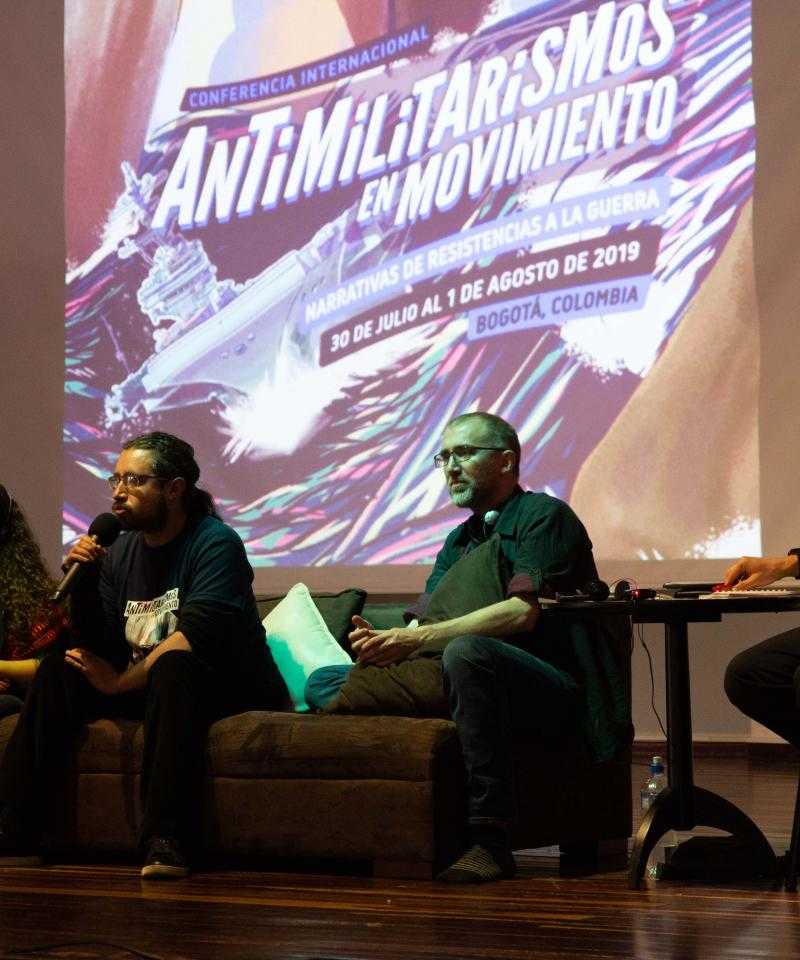Antimilitarism in Movement!

From July 30th to August 1st 2019, activists from across Colombia, Latin America and the wider world gathered in Bogota for the Antimilitarism in Movement conference, a three day gathering to explore the intersecting experiences of war and militarism - and our movements’ resistance to militarism – from around the world.
The programme was designed and led by organisations in Colombia. Each of the two morning plenaries focused first on experiences in Colombia, then Latin America, and then the wider world. The first day focused on experiences of militarisation, and the second day on different approaches to resistance. The second day in particular brought out the real diversity of resistance present in the room, with contributions exploring:
-
organising subsistence farmers in Colombia,
-
community resistance to extractivist and large-scale infrastructure projects in Latin America,
-
resisting border militarisation on the Mexico/USA border,
-
campaigning against arms fairs and nuclear weapons in Europe,
-
building peace communities in a post-conflict situation like South Sudan
Theme groups
The plenaries were followed by “thematic groups”, which were organised into three key types of “peaces”, the world pluralised to reflect the complexity and diversity of how peace is manifested. The three key themes were broken into various sub themes, which gave the opportunity to explore a particular problem and their resistance to it. The themes and sub themes were:
-
Diverse Peaces
-
-
Exclusion (discrimination)
-
Identities (patriarchy, heteronormativity, feminisms)
-
Fear and social control (militarisation of media and technologies, militarisation of education)
-
-
Just Peaces
-
-
Repressive models (youth militarisation, criminalisation of protest, police militarisation)
-
Political transitions and justice models (security, punitive justice models hegemonic models of conflict resolution)
-
-
Sustainable Peaces
-
-
Environment (climate change, climate justice)
-
Territory (land, border conflicts, access to resources)
-
Development (extractivism, wealth concentration, agriculture, arms trade)
-
The activities in each sub theme group were facilitated by a member of the Colombian organising group, who led participants through a series of exercises. First we identified common concerns, framing and understanding, before mapping out our own work, contacts and relationships. We ended by identifying and naming common action points, and developing some of these into action plans. Around two dozen different action points were identified and discussed by different groups in detail. Some of these action points involved the conference organising groups (like War Resisters’ International, ACOOC, Cuerpo Consiente, RAMALC, and Justapaz), some were internationally focused while others were rooted in a particular context. This focus on building towards future projects will allow us to evaluate in the coming months the impact the conference has had, and in the coming months we will be asking participants which of the projects moved forward.
Workshops
Finally (at least, in terms of the formal programme), participants were invited to contribute to the programme directly, by delivering workshops on specific projects or themes. These spaces allowed participants to delve into even more detail on particular subjects, such as:
-
peace education activities in Germany,
-
the Israeli arms trade in Latin America,
-
“constructive programme” forms of nonviolence,
-
a nonviolent rock festival in Colombia,
-
a number of specific case studies of nonviolent resistance.
The conference aimed to bring together a diverse range of participants with a focus on participation, sharing experiences and communication across borders means that the outcomes of the conference will be very “distributed” across different contexts, situations and with different people responsible for their fruition. This should mean that the outcomes are also relevant to particular contexts and experiences. The goal of the event wasn’t on a few individuals being given a platform, a single statement written by a small group of people, or vague declarations expressing a political position, but on forming interconnected relationships based on mutual understanding, shared analysis and future cooperation. The conference sought to create a space where many different experiences and narratives, from a wide range of different countries and contexts, could come together to share, contribute and organise collectively.
Add new comment